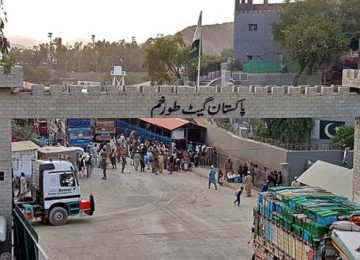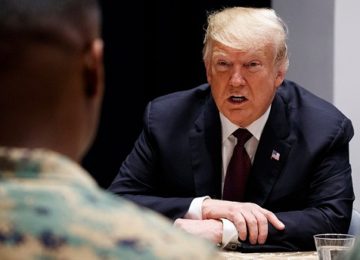The willingness of the Trump administration to take unorthodox risks has created perhaps the best opportunity in decades for peace on the Korean Peninsula, notwithstanding the recent contentious rhetoric from both sides that illustrates the enormous obstacles still ahead. This raises the question of where else this diplomatic style might be effective.
Afghanistan is a strong candidate. Why? The North Korea and Afghanistan problems share discreet similarities. Each is a stalemated conflict that military force is unlikely to resolve, each involves international pariahs who want to mend fences with the United States, and each has a rare window of opportunity, in Afghanistan owing largely to a national ceasefire of three days last month. Washington and others should take advantage. Five lessons from the North Korea talks illustrate how.
Invite an adversary back into the fold
First, while Pyongyang and the Taliban have been quintessential “rogue actors” for decades, both hope one day to gain international validation, which offers America leverage. Trump’s willingness to engage Kim Jong Un has elevated the latter on the world stage. It created an opening to achieve objectives that Pyongyang could not achieve through confrontation. The Taliban share this desire for better relations with the outside world, as shown by frequent public requests for an internationally recognized “political office” and relief from the stigma of United Nations sanctions, suggesting a more viable negotiating partner than more radical militant groups like Al Qaeda or the Islamic State.
Leverage American military presence
Second, the North Korea example demonstrates that an American military presence offers powerful negotiating leverage if U.S. negotiators are allowed to use it. Trump’s willingness to discuss Kim’s security concerns and to suspend military exercises that North Korea deems provocative has helped keep Kim engaged. Similarly, the Taliban’s defining goal is to secure a drawdown of foreign troops from Afghanistan.
This demand provides useful leverage if Washington is willing to discuss, and ultimately to alter, the American military presence as part of a formal peace process and in response to significant milestones like a sustained reduction of violence. Afghan President Ashraf Ghani and Secretary of State Mike Pompeo wisely tapped this lever in their statements in June, affirming that any serious negotiation would by necessity discuss the status of foreign forces. This is a positive sign.
Negotiate directly with the other side
Third, direct negotiations with Pyongyang in late spring by Pompeo, at the time CIA director, arguably built more momentum in weeks than did indirect channels in the previous 15 years. Talks with the Taliban need not start at Pompeo’s level, but a direct channel would both improve the United States in its ability to address key security interests in Afghanistan, and reduce widespread skepticism in Afghanistan and its region that Washington sincerely seeks peace through negotiations. The New York Times reported this month that the Trump administration approved such a direct channel. If accurate, this is an important step.
Build confidence and goodwill locally
Fourth, confidence-building measures were crucial to launching the North Korea process. Kim released American prisoners, dismantled a testing site, and suspended nuclear and missile tests. Trump suspended military exercises and signaled openness to redeploying American troops. As in most negotiations, these confidence-building measures are politically risky and mostly reversible, but they can also build goodwill.
Past confidence-building measures with the Taliban have been divisive, including the 2014 prisoner transfers that brought home Sergeant Bowe Bergdahl, but such steps can help bridge the gap to substantive peace talks. Possible measures now could include formally opening a Taliban office, lifting sanctions on designated Taliban members who have played no discernable role in the insurgency after 2001, and exploring additional truces or reductions of violence in the wake of the recent ceasefire.
Use parallel tracks to engage parties
Finally, the United States and South Korea have thus far maintained largely complementary channels with Pyongyang. President Moon Jae In has deftly advanced his own discussions in part because of Washington’s willingness to engage Pyongyang in parallel. President Ghani has been flexible and creative in offering peace to his Taliban adversaries, but the Taliban want to know if United States is similarly committed.
This sequencing dilemma, with the Taliban wanting to talk to Washington first while all other parties want the Taliban to talk to Kabul first, has hindered peace talks for nearly a decade, but there are ways to sidestep it without playing into the Taliban desire to delegitimize the Afghan government. Talks between the United States and the Taliban now could reveal new paths to talks between Kabul and the Taliban in the near future. A outside mediator could immediately allow for proximity talks among the sides,and quiet authorized backchannel discussions could convene unofficial envoys who have no hang ups about who sits at the table.
It is far from certain the North Korea talks will yield a substantive breakthrough, but to get this far, the Trump administration has shown a willingness to break with orthodoxy and assume political risk in addressing even one of the most high-profile conflicts in the world. This may prove a helpful quality in a rare and fleeting moment of opportunity in Afghanistan. The North Korea peace effort has already broken historic ground, and with the right bold gestures, Afghanistan could be next.
This article originally appeared on THE HILL on July 23, 2018. Original link.
Disclaimer: Views expressed on this blog are not necessarily endorsed or supported by the Center for Research and Security Studies, Islamabad.








